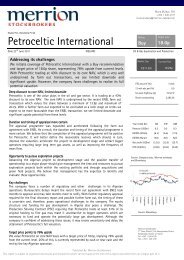Quarterly Bulletin Q3 2013
Quarterly Bulletin Q3 2013
Quarterly Bulletin Q3 2013
You also want an ePaper? Increase the reach of your titles
YUMPU automatically turns print PDFs into web optimized ePapers that Google loves.
Developments in the International<br />
and Euro Area Economy<br />
<strong>Quarterly</strong> <strong>Bulletin</strong> 03 / July 13<br />
55<br />
Chart 2: Selected Global Inflation Rates<br />
Chart 3: G3 GDP Growth Rates<br />
12<br />
% Year-on-Year Change<br />
1.2<br />
% Quarter-on-Quarter Change<br />
10<br />
1.0<br />
0.8<br />
8<br />
0.6<br />
6<br />
0.4<br />
4<br />
0.2<br />
2<br />
-0.0<br />
-0.2<br />
0<br />
-0.4<br />
-2<br />
-0.6<br />
-4<br />
Jan<br />
Mar<br />
May<br />
Jul<br />
Sep<br />
Nov<br />
Jan<br />
Mar<br />
May<br />
Jul<br />
Sep<br />
Nov<br />
Jan<br />
Mar<br />
May<br />
Jul<br />
Sep<br />
Nov<br />
Jan<br />
Mar<br />
May<br />
Jul<br />
Sep<br />
Nov<br />
Jan<br />
Mar<br />
May<br />
Jul<br />
Sep<br />
Nov<br />
Jan<br />
Mar<br />
May<br />
-0.8<br />
Q2<br />
<strong>Q3</strong><br />
Q4<br />
Q1<br />
Q2<br />
<strong>Q3</strong><br />
Q4<br />
Q1<br />
Q2<br />
<strong>Q3</strong><br />
Q4<br />
Q1<br />
2008 2009 2010 2011 2012 <strong>2013</strong><br />
Brazil China Euro Area India<br />
Japan<br />
United States<br />
United Kingdom<br />
2012 <strong>2013</strong><br />
2012 <strong>2013</strong><br />
2012 <strong>2013</strong><br />
US UK Euro Area<br />
Source: Thomson Reuters Datastream.<br />
Source: Thomson Reuters Datastream.<br />
Section 1: Euro Area<br />
Economic Growth – Recent Developments<br />
The euro area remained in recession in the<br />
first quarter of <strong>2013</strong>, and has recorded six<br />
consecutive quarters of declining GDP. The<br />
contraction of 0.2 per cent was broadly in<br />
line with expectations and an improvement<br />
on the preceding quarter. Four out of the five<br />
largest euro area economies are experiencing<br />
recession: the main drivers of the Q1 <strong>2013</strong><br />
contraction were Italy and Spain, each<br />
recording a decline in GDP of 0.5 per cent.<br />
France is now in technical recession, following<br />
a second quarter of contraction. In contrast,<br />
Germany recorded a return to weak growth of<br />
0.1 per cent, a little below expectations.<br />
Domestic demand continues to exert a<br />
significant drag on GDP growth across<br />
the euro area. In particular, investment has<br />
declined for the eighth consecutive quarter.<br />
In contrast, private consumption grew by a<br />
marginal 0.1 per cent in Q1 <strong>2013</strong>, following<br />
five consecutive quarters of contraction. The<br />
contribution from net exports to GDP growth<br />
was also marginally positive in Q1 <strong>2013</strong>,<br />
reflecting further declines in imports arising<br />
from weak domestic demand conditions,<br />
while exports faltered over the quarter against<br />
a background of subdued global import<br />
demand.<br />
High frequency data were mixed in the second<br />
quarter of <strong>2013</strong>. Conditions in retail sales<br />
remain challenging as low levels of consumer<br />
confidence continue to weigh on consumer<br />
spending. Activity during Q1 <strong>2013</strong> was<br />
marginally up relative to the preceding quarter,<br />
while data for April again suggested a difficult<br />
trading environment as retail sales declined 0.5<br />
per cent relative to March. Industrial production<br />
showed some tentative signs of stabilisation<br />
in the three months up to April, most notably<br />
in capital goods where monthly gains have<br />
been recorded each month since February.<br />
The improved industrial production data reflect<br />
solid conditions in Germany, while activity in<br />
the rest of the euro area remains flat.<br />
More recent survey data point to an easing in<br />
the rate of decline in the euro area as a whole.<br />
The EU Commission’s Economic Sentiment<br />
Indicator (ESI) remains well below its longterm<br />
average value, with uneven monthly




